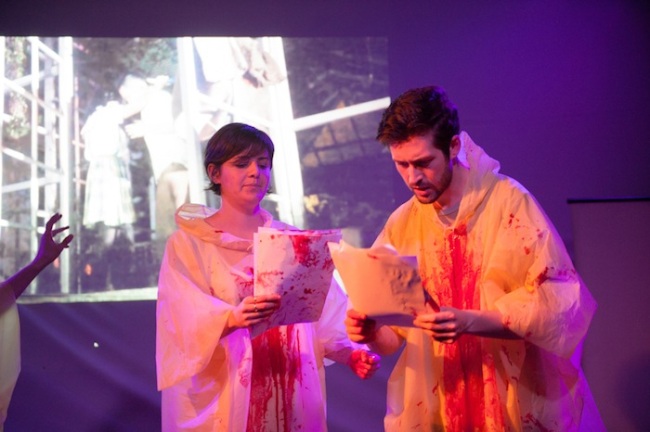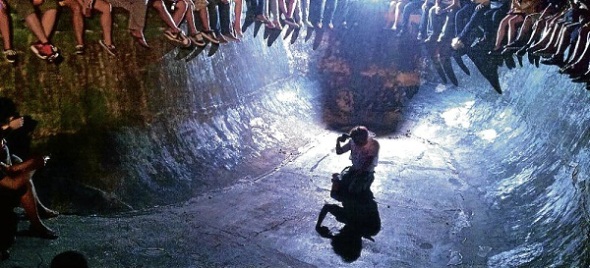A few years ago I made a whole lot of people angry. I wrote an essay against the glorification of models and actors endangering themselves for the sakes of art. To be honest, these people were mostly pissed off because I wrote it in a really rude, self-righteous way (oh youth!) but I want you to know that I stand by the sentiments I expressed in that article: that duty of care should be at the heart of a rehearsal room and that art is seldom worth physical or mental endangerment. I want you to know that before I tell you about A Wake: Kids Killing Kids. I want you to know that I am still that person and yet, and yet, and yet….
And yet I want you to know that I left that show with a feeling in my chest that took me sixteen hours to name. It was pride. Immense pride in artists and in being part of a global community of theatre makers that push hard against ease and complacency and thoughtless acceptance of the status quo. I was so proud of these artists, the Australian collective Too Many Weapons and Filipino site-specific theatre company, Sipat Lawin. Their fearlessness, their riskiness, their passion and their generosity filled me up.
I had said that I would record audience interviews during Next Wave, but when Kids Killing Kids finished I turned to my friend and said “I don’t think I can do it for this show.” Partly this was because of my own emotional reaction but mostly I was so incredibly aware of how much had already been said about this work and its predecessors: Battalia Royale and the Melbourne Fringe season of KKK. I felt that what these artists deserved was some silence. However, saying aloud that I had planned to interview people meant that the friend instantly found me two audience members. Thirty seconds later I was seated on the floor outside the theatre with the incredibly lovely, incredibly thoughtful Josiah Lulham and Anatol Pitt. The conversation was a beautiful reminder of just how hard audiences are working in the dark of a theatre, how much consideration they give to the art they are seeing and how good it feels to be intellectually challenged by work. I’m very glad I didn’t slink away into the night. Enjoy. And thank you once again Too Many Weapons and Sipat Lawin.
SFB: Can you tell me what just happened in there?
Anatol: That’s probably the hardest question you could ask.
Josiah: Well the show itself – A Wake: Kids Killing Kids – is the second season of a performative lecture in the Next Wave Festival. So that’s the obvious thing.
Anatol: So what you saw before, was that a lecture as well?
Josiah: Yeah. Yeah. But without the Sipat Lawin ensemble.
Anatol: Okay. Yeah. So it would have been quite different.
Josiah: Yes. It was the four writers (whose names I always forget) but I know Jordan and David –
SFB: And Georgie –
Anatol: And Sam.
SFB: Team work. We got there.
Josiah: I remember last time I saw it with a couple of friends and the over-whelming experience that they had – not that I had personally but that they had – was watching these four white, elite-educated Australian artists talk about this fun show they made but didn’t consider and how it blew out of proportion and was quite dangerous. They were very critical of them as makers. Seeing it tonight was awesome because you had that extra perspective from the Sipat Lawin ensemble.
Anatol: I would have felt uncomfortable without Sipat Lawin, I think. It changes things a lot.
I was coming in slightly naive but with a slightly critical perspective because it is such a touchy subject. I wanted to step back and try to get an idea of what was happening and why they were talking about it and what that means for the work. Were they being critical of themselves or was it a defence? So I sort of oscillated between that and getting really into the story.
Josiah: It is a very engaging and compelling performance. The last one was also so engaging. You are there and you’re rocking along with the story.
Anatol: Does that (the compelling nature of the performance) stop you from engaging in a critical dialogue about it? I’m not either way on this but I’m taking different perspectives because I’m not quite sure where I actually stand myself and I’m trying to work it out.
Then there is the participatory nature of the original show, of Battalia Royale – well I could rant about participatory art in general –
SFB: Please do!
Anatol: Well what it can mean is that the artist doesn’t necessarily have to take full responsibility for what they are doing. It puts everything back on the audience. They can keep responsibility at arms length and say ‘you made this happen!’ For good and for bad.
SFB: Robert Reid has spoken about this on my blog and in various other interviews –
Josiah: He’s so cool.
SFB: That’s definitely going to make the cut. Rob talks about participatory theatre as engaging a totally different part of your brain to that cool analytical part that you watch traditional theatre with. It is the ‘what’s going on over there? I dropped my thingie!’ part of your brain. So Kids Killing Kids is engaging a completely different mode of thinking – a completely different part of the audiences’ brains – to how we would all respond if we were thrown into Battalia Royale, which, personally, I doubt I would survive as an audience member. I would not cope well. Just looking at the blood and the wounds at the beginning – and the wounds were laid out on a table! The table was wounded! Not an actual person! – and already I was like ‘oh dear. Mum Fleur is kicking in.’
Josiah: Well they were extraordinarily realistic. All the blood at the end? Part of me was going ‘wow! That’s really realistic!’ and the technical theatre part of me is going ‘I wonder what mixture they’re using?’
SFB: It looked runnier than the old chocolate sauce and food dye recipe. Good times. We could discuss that for a while.
Josiah: It is funny looking at the videos of Battalia Royale. When they showed first video (and it is the first time in the lecture that you’ve seen the actual show) you’re shown violence. Someone is scalped and is dying on the floor and someone is shot and there’s a samurai sword and it is very bloody. While that’s all happening there is a live audience cheering. I watched that going ‘haaaaa.’ In Kids Killing Kids they perform some of the scenes and, as an audience member here, you’re not going ‘kill them!’ You’re going ‘man! That scene is really hard.’ because we have all this context. I can’t imagine what it would be like to be an audience member in Manila. It looks like such an overwhelming experience.
I really liked Jordan saying at the end that you can be ethical and careful but if that prevents you from making something that is potentially nerve-touching, that could be negative as well.
Anatol: See I felt uncomfortable about that particular line. I just feel that, if you take that argument to its limits, it can become dangerous. Self-censoring and saying ‘that’s too provocative’ is different than –
Josiah: ‘I’m just going to throw ethics out the window and just go crazy.’
Anatol: Yeah, there’s ethics but there is also –
SFB: Responsibility.
Anatol: Kind of responsibility, yeah! But not like ‘am I touching nerves with the audience’ more like ‘why do I want to make this?’
A friend interrupts: We’re going. See you at the bar?
Josiah: Yeah. Yeah. I’ll text you!
The friends leave.
Josiah: To me. You’re welcome to join us, by the way.
SFB: Thank you. I’ll see how I’m going. (I totally went home and took anti-histamines like the old lady I am.)
Josiah: One question that came up (a question they tried to engage with last time when it was just the four of them without the Sipat Lawin ensemble and didn’t really have an answer for) was ‘why make this work?’ Having seen their show I now approach a lot of shows with that question. Why now? I get that you are adapting Oscar Wilde to the stage or I get that you want to re-stage a Patrick White play or I get that Stephen Sewell is really interesting but it is a play from the 80s so why now? It is a very useful critical question that I brought away from the last season. It is so great to have the Sipat Lawin ensemble here because I feel like you have much more of an understanding of the ‘why.’ That wasn’t very well represented in the last one.
SFB: I think deliberately. They almost played up their naivety. They are four incredibly cluey makers but I think they played up the blundering white kids thing. They played that up and I think that was partly them not wanting to appropriate the story that wasn’t theirs to tell: the experience of performing Battalia Royale night after night and engaging with the audience as fellow Filipinos. I think they deliberately played that naivety out of respect for their collaborators, and that was incredibly brave and selfless of them because it provoked more heated discussion than if they had played themselves as all-knowing. But it meant audiences might leave questioning their motivations and their sanity.
This time I felt really satisfied by their engagement with the work. And they got to me. My chest hurts from just watching that. My breath isn’t right yet. It affected me physically.
Josiah: Some of the testimonies from the Sipat Lawin ensemble were heart-breaking. One of the actresses talking about playing her role and asking ‘why is the audience cheering? I have a character who is very real to me. I’m getting brutally murdered on stage and this audience is cheering for my death. That feels wrong but, at the same time, I want to continue making this work.’
I was watching her get tears in her eyes and I’m like ‘oh my God!’
SFB: Well there are still things that trouble me. While I do feel so much more confident in the work they were making, I think they needed more support than they were getting. She said she wished she had been able to engage more with her fellow actors. That broke my heart. We are in the process of casting a really intense play that has audience participation and we are so aware of finding an ensemble that will support each other. That will have each other’s backs on stage and when working with the audience. It did ring some warning bells for me that she felt isolated. So there are some things I’m sure they would do differently if they came back to it ten years later but there was a driving passion and commitment and urgency behind the work that I now understand when I didn’t last time.
Let’s wrap it up. Tell me how you are feeling after having seen that.
Josiah: Slightly over-whelmed and –
Anatol: Provoked.
Josiah: Provoked.
SFB: Well thank you for talking to me whilst you were still so over-whelmed and your heart rate was still up. Thank you for letting me drag you out to sit on the carpet and speak to me for eighteen minutes and… three seconds.
Thank you to my lovely proof-reader, Andy Taylor.

